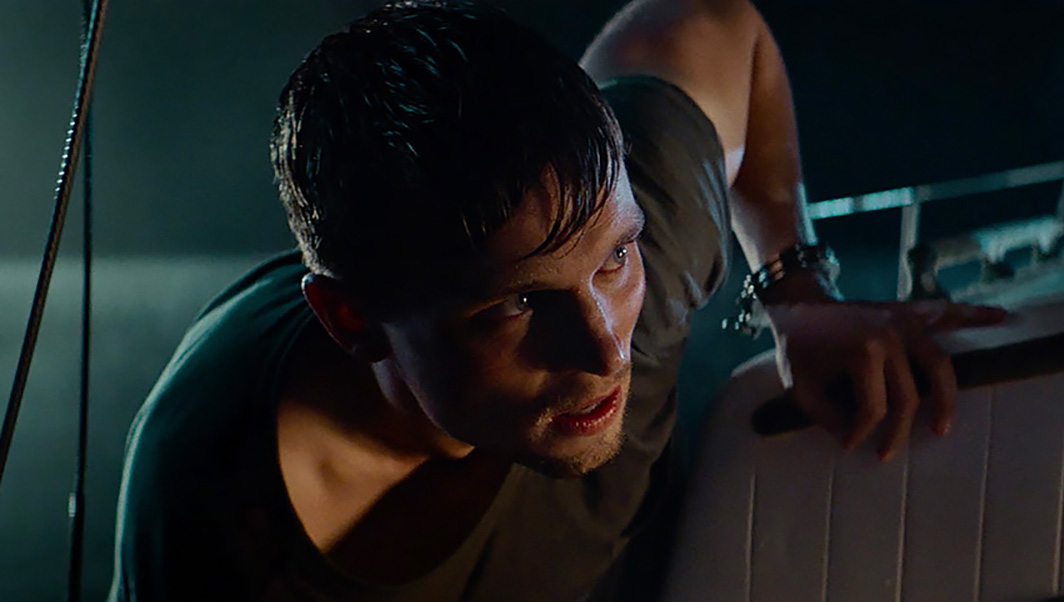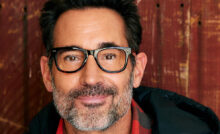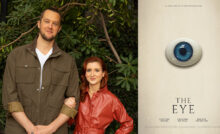Exclusive Interview: Darren Mann Talks ‘Breakwater,’ His Love for Independent Cinema, His Character Development Work, and More


Darren Mann stands out as one of the industry’s most exciting leading men, celebrated for his transformative performances and exceptional character work in notable projects such as Embattled, 1923, Animal Kingdom, and Fortunate Son.
In his most recent independent venture, Breakwater, Darren Mann takes center stage in an enthralling, edge-of-your-seat thriller. The film unfolds the gripping tale of a young ex-convict, risking his newfound freedom to trace the estranged daughter of a fellow inmate, unwittingly ushering a devil from her past straight to her doorstep.
Pop Culturalist had the privilege of catching up with Darren to delve into the intricacies of Breakwater, his profound appreciation for independent cinema, his meticulous character development process, and more.
PC: You’ve been a part of so many fantastic projects. What is your process like when deciding what you want to be involved in? What was it about James Rowe’s script and this character, in particular, that resonated with you?
Darren: I just love telling great stories that I think people need to hear. These independent films are always my favorite. It’s about the story. There’s not necessarily the funds to do a whole bunch of explosions and action, but it gets down to the nitty-gritty of the people and the story. Right away, I read James’ script, Breakwater, and I thought, “Man, this Dovey character is not one that I have done before.”
So there was a bit of a challenge there for me, which I always enjoy. I loved his arc and what he goes through and who he becomes. The story is fun. I love the ending. I don’t want to give it away, but I really appreciated how James brought it all together. It’s such smart writing by him. You could tell that he really took his time. There are a lot of neat throughlines that we see like, “Oh, that came back. He can hold his breath,” again, I don’t want to give away too much. [laughs] But it definitely stood out to me as a really strong script and a chance for me to play a character that I hadn’t played before, flex my acting muscles, and get after it.
PC: Speaking of flexing those acting muscles, there’s a lot of vulnerability that you have to tap into for your character as he tries to reintegrate himself into society and all the trauma that he’s experienced from his time in jail, which you brought so much depth and sensitivity to. How did you create the space for yourself to dive into those emotions, especially because there are a lot of questions about whether or not he deserved to be in jail in the first place?
Darren: I really needed to chat with James and gather information from him. I needed to create that backstory for myself and make that really clear of what happened, why was I in prison? From there, I spent a lot of time in my basement where I would hang out and sit with my Dovey journal and sit with nothing to do for a few hours because I thought this guy’s in jail. He’s sitting there. There’s nothing to do. What’s he thinking about? Who’s he thinking about? What is he writing about when he’s writing? I wasn’t trying to go and lock myself in prison, but I wanted to give myself that time to let it breathe, sink in, and really try and get into his head. I found that really beneficial.
We got to shoot in a real prison, which was shut down a year prior to us filming there. That helped a lot as well because I got to go around to different cells and sit in them reading what was scribbled on the wall. There were magazines left there. There were pictures still up in some of them. I was really trying to understand what these guys were feeling, what they were going through, and what their day-to-day was like.
PC: There’s always a level of commitment that you bring to all of your characters. Was the accent a choice that you made creatively for Dovey, or was that originally on the page? Walk us through a bit of your character development process. What were other aspects of him that you wanted to help elevate after you got cast?
Darren: I can’t even remember if they asked for an accent. I think it may have been more generalized, but for me, I was like, “No, he’s a fisherman kid from the coast in a small town; he’s going to have an accent.” It helped as well knowing that JD Evermore was playing my father. I knew that he had a southern accent.
For me, it was really trying to figure out who Dovey is and where his energy sits inside of him. Then trying to find that vocal placement for him and trying to harness it from there. Once I found where that sits, doing little tweaks with my wife, who is from Alabama, which also helps. That’s really how I got into his voice.
PC: During Dovey’s time in jail, he finds a mentor in Ray. Who were the people in your own life who’ve influenced your journey as a storyteller and as an artist? Did you channel any of them into the relationship and dynamic between your character and Ray?
Darren: My brother has always been the closest thing I’ve had to a dad growing up. He’s my big brother. He’s seven years older than me and I’ve always looked up to him and I’ve always really appreciated his wisdom and his advice. I felt that a bit with the relationship with Ray in prison. That was a little similar to me and my brother.
Ray is like my quasi-dad in the story. My father in the story had been locked up before. I’ve been gone. We didn’t have necessarily a lot of time together. I tried to feed off Dermot [Mulroney], and he was so great. I’m so lucky to have such an awesome castmate. He’s such a blast to work with and he’s so good at what he does. He was giving me tons, and that really helped me feed off of that.
PC: The chemistry between the entire cast is so electric on screen. I know that you didn’t have a huge amount of time to get to know each other, but how were you still able to bring those different dynamics to life? What was your favorite behind-the-scenes moment?
Darren: There were so many. The beauty of Breakwater was that everybody was there for the right reasons. Everybody wanted to be there to tell this great story that James had put together from our producer Matt Paul, our DP Kai Krause, Alyssa [Goss], myself, Dermot, to all of our supporting cast. Everybody showed up and wanted to be there, which was very evident.
It’s really nice to work in an environment with people who are doing what they enjoy doing and what they’re great at doing. We were really blessed with this script, production, and to have such a committed, talented team come together.
PC: I feel like you all helped elevate each other’s performances. You touched upon this already, but you shot all of this on location. How helpful is that for you as an actor as you’re stepping into this character to bring that authenticity as opposed to working on a soundstage or green screen?
Darren: It’s huge. That’s something in a lot of independent films that’s just beautiful; you’re often shooting on location. That feeling of being inside of a real prison, you walk into the door, and you can feel that energy, that heaviness, and that’s a lot different than when you have to create that and you have to remind yourself how it would feel like to be in these different settings when you’re shooting on a soundstage.
The beauty of shooting on location is that you’re getting to take out a little bit of the acting and you’re really getting to be a little more. You’re really in that setting. You’re really on the fishing boat, pulling up a crab trap or whatever it is, it’s so much easier when you’re doing it for real.
PC: The cinematography in this film is breathtaking. Without giving any spoilers, there’s an underwater sequence that happens at the end that is so gripping to watch. I imagine there are so many different moving pieces from the emotions that you have to bring to the scene to the choreography involved, and then you add the fact that you’re also underwater. What was that preparation like getting ready for that moment in particular? What was your reaction when you saw that final cut?
Darren: Oh man. I remember when I first read it, I was like, “Wow, that’s really cool. I wonder what camera tricks we will have to do to pull this one off.” [laughs] But there were no tricks. We were in there for real, right in the water with each other.
One of the tough parts of that was that you had your clothes on in the pool, and you’re trying to tell this story, so you need to keep your eyes open. You got to stay in that zone as well as physically looking after yourself and making sure you’re getting out of the water in time. But we had such a great team around us with James. He’s so calm and collected. He’s so intelligent. His vision is so clear that it makes it very easy when you’re going into a day where you’re shooting that underwater sequence. He’s got his board with him. He knows the shots that he wants and the angles he’s looking for. He’s prepared. It makes us feel a lot more at ease to play inside with what we’ve got because we know he’s got it all sorted out. I don’t have to worry about that stuff. I just have to do my job and do my thing in the pool.
I thought it came out really cool. I love that sequence. I feel like I’ve checked it off my list now so it’s like, “Don’t need to do another pool scene.”
PC: James wrote and directed Breakwater. How different is that experience when the person who’s created this universe and these characters is also at the helm directing? What was that collaboration like?
Darren: I love working with writer-directors because you have one person to go to with all your questions and they definitely know the answer. They’re not trying to play middleman for somebody else. It’s pretty cool to be able to go straight to the source. He knows the story better than anyone and he has the vision being the director.
It’s pretty nice when you’re in those situations as well as the fact that we’re lucky that James being a writer-director is also very easy to work with. He wanted to hear our input coming from the character side because I’m sure it’s tough for him at times to be in everybody’s head, so sometimes, you got to rely on the person who’s just focusing on that one character. He was so open and receptive to receiving any kinds of ideas we had as well. It was such a collaboration and it made it so fun to do.
PC: You’ve worked on projects of all sizes. What is it about independent filmmaking that excites you as a creative?
Darren: I think they’re the best stories. They’re the stories that we all need to be listening to. Hopefully, a lot of them can teach us something or there’s something positive that we can take out of them and put into our own lives. That’s where my heart sits with independent film. It’s my favorite kind of art. It’s about the characters. It’s about the story and that’s always number one. Those two things at the top really make it for me.
PC: The film has made its way around the festival circuit and it’s been incredibly well received. What do you think is resonating most with them? What do you hope they take away?
Darren: It’s such a unique spin on an older genre with an ending that’s very appealing to the audience, which I appreciated. I don’t want to give it away, but nowadays, there’s a lot of darkness out there. The world can be quite heavy. There’s been some tough years for everybody recently; the pandemic, strikes, whatever it may be. It’s nice to go to a theater and watch a film that has an uplifting finish. I really appreciated that aspect of James storytelling and that really connected with me and the way I want to tell stories.
PC: You’ve never been better. With the film out now, is there a scene, outside of the water scene, that you’re most excited for audiences to see?
Darren: PC: You’ve done so much already in your career. What’s next and what’s left on that bucket list?
Darren: The bucket list is long. I’ve got a lot to check off which is great. But what’s next for me if I could choose, I would love to do another fight film. A fight film with a great story. That’s what we had with Embattled, which I loved so much, because it wasn’t just about the fighting. There was great character drama that also happened to revolve around the world of fighting. I love that sport, whether it comes to MMA or boxing. I love it. I’d love to tell another MMA/boxing story.
PC: It’s a great playground for you to play in. Hopefully, we’ll see you direct, produce, and write again in the future!
Darren: That’s what I’m talking about. I love writing. I would love to direct. That’s definitely high on my bucket list.
To keep up with Darren, follow him on Instagram. Watch Breakwater wherever you stream movies.
Recent Posts
Exclusive Interview: Gregory Zarian on Living Fearlessly, Loving Freely, and Holding Space in ‘Venice: The Series’
In a world where we’re constantly bombarded by headlines filled with division, tragedy, and heartbreak,…
SXSW 2025: Rachel Lindsay Brings ‘Higher Learning’ and Her Platform with Purpose Home
Rachel Lindsay is no stranger to breaking barriers. A former attorney and media personality, she’s…
Exclusive Interview: Marieve Herington on Crafting ‘The Eye,’ Exploring Anxiety Through Art, and Finding Freedom in Indie Filmmaking
Known for her work in comedy, Marieve Herington takes a bold step into new creative…
Exclusive Interview: Asher Angel Shares the Story Behind “thinkin bout me,” His Most Personal Music Yet, and a Potential Tour
From Disney breakout to superhero on the big screen, Asher Angel has spent more than…
Exclusive: Ghosting Co-Host Luke Hutchie on Season 2’s Scariest Surprises, Haunted Hotspots, and Dream Guests
When it comes to blending comedy, horror, and real-life paranormal investigations, Ghosting is unlike anything…
Exclusive Interview: Alexander Calvert Talks ‘Double Exposure,’ Exploring Art, Grief, and Alternate Realities
Alexander Calvert has built a career defined by compelling, multifaceted performances that transcend genre. The…


